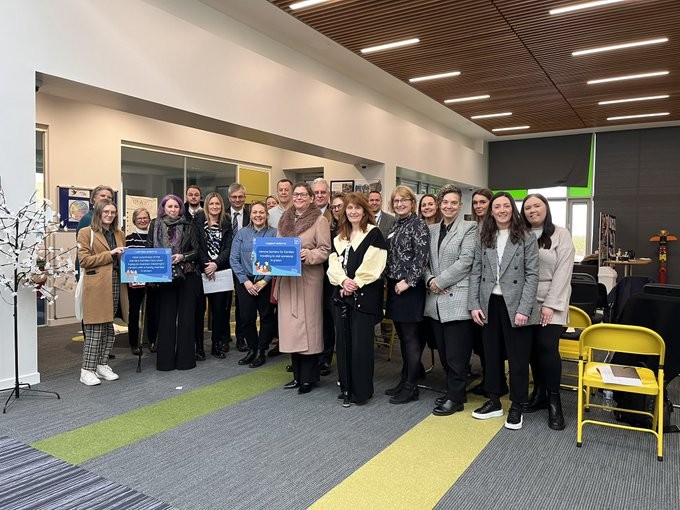
Annie McCormack,TARP Aberdeenshire Development Officer,The Poverty Alliance
Many children and families in Scotland have to deal with both poverty, and the imprisonment of someone close to them.
Some 45 per cent of all arrivals in prison come from Scotland’s 20 per cent most deprived areas, and when a family member goes to prison, the strain on the family finances is only increased.
I recently attended a roundtable at HMP Grampian, organised by Families Outside. It was designed to highlight their No Easy Journey campaign.
It was held in the Family Centre and Help Hub. It was bright airy and welcoming, and run by Action for Children to support families visiting loved ones in prison. It provides a friendly warm atmosphere and also practical support through a larder, and access to clothing, and hygiene items.
There was mix of people there from the Scottish Prison Service, Inspectorate of Prisons, Action for Children, Community Justice, local community development and community transport activists, tackling poverty and inequalities from Aberdeenshire council, as well as Scottish Government, SACRO, reps from local MSPs, and Cfine.
For many of those who attended on the day, they had come using cars, private transport, and travelled comfortably. A few mentioned attempting public transport but they wouldn’t have arrived on time or it would have cost over £40 from other parts of Aberdeenshire. Many left very early to attend.
The cost of travelling for prison visits is a real problem for families on low incomes. Families Outside’s financial impact report, Paying the Price: The Cost to Families of Imprisonment and Release, found that many families spend more than a third of their monthly income supporting someone who has been sentenced to prison, while families supporting someone on remand spend more than half of their monthly income. These costs overwhelmingly fall to women on low incomes.
Families Outside has been raising this issue since at least 2002. Their research highlights the same recommendations time and again, with no change happening. We heard a call from Families Outside to move from words to action.
The link between having a family member in prison and poverty is an obvious one, when you think about it. Losing a wage earner reduces family income, but also its costs a family to maintain face-to-face contact, particularly in Aberdeenshire, where transport links are not designed to get you to HMP Grampian in good time for a 9.30am visit on a Saturday morning.
Families Outside shared case studies of families travelling 8 hour round trips, children leaving school early and getting home at 11.30pm to visit parents, and of family members taking on second jobs.
The average spend on travel to visit a family member per month is £75. In HMP Grampian family visits are currently offer on a Wednesday afternoon and a Saturday morning. Virtual visits are also offered, but Families Outside are clear that these should compliment, not replace, face-to-face visits.
So why are family visits so important? Prisoners are less likely to reoffend if they maintain family contact. And its as simple as that.
As the recent No Easy Journey report points out:
People in prison and their families, who are already struggling, are being squeezed financially to the point of being crushed. Many families who are already struggling simply cannot afford the extra costs to maintain effective contact with the person in prison, and the current systems set up to support them are not working.
The more we heard about the issue, the more it highlighted how it cuts across different human rights issues.
Women are disproportionately affected by having a loved one in prison, and we know that women are already more likely to suffer the injustice of living in poverty.
There are issues around the UN Convention on the Rights of the Child, where children have a right to education, but in the case of family visits, often have to be taken out of school to maintain contact with a parent. And because additional travel costs also affect children in the home, there was a call for the issue to part of local child poverty plans.
Prisons are also often situated in hard-to-reach places, and for families who may also live in rural areas this adds further expense and time to journeys, with many having to factor in an overnight stay to make sure they will be at the prison in time for the set family visiting times.
But there are examples of solutions that work for families locally. In Edinburgh, SACRO uses volunteer drivers to take families door-to-door from home to prison and back for prison visits. This seems to help remove the stigma of worrying about people knowing where family members are going. It also builds relationships with drivers, often ex-professionals, who can provide support, sign posting, and be a non-judgemental listening ear. The service is funded with ongoing support from the City of Edinburgh Council.
This kind of project could be rolled out across Scotland, but it would need a commitment from local councils, and an anchor organisation in each area to mould it to local needs.
And even then, it’s unlikely that one idea will fit all needs, so a few interventions might need to be implemented. One suggestion was also a free bus pass for families, or commercial bus routes and times that not only benefit families, but also staff working at the prisons.
Whilst there is an existing scheme to help financially with prison visits, it only reaches a small number of families who qualify for it, and it involves claiming back expenses, leaving households out of pocket. It pays 13p per mile for car users. We heard that the scheme needs developed if it’s going to be a meaningful support for families.
So what next? Well, there are 14 recommendations in the January 2024 No Easy Journey report for a number of bodies, including the Scottish Prison Service, local and national government.
And perhaps the key to making progress is to keep the conversations going, share contacts, and be willing to try things out. In Aberdeenshire there was a scheme similar to SACRO’s in Edinburgh, but it was only funded year-to-year and couldn’t be sustained. So how can we build commitment from local authorities and others who hold corporate responsibility? Maybe it’s time to reframe prison visit support as a human rights issue under the UNCRC, or make it part of local development plans to tackle child poverty? Either way we need to keep talking about the issue. Because it isn’t going away.


Enter your email address to receive regular e-updates about our work. If at any time you want to stop receiving these, simply contact us. We’ll keep your details safe and won’t share them with any other organisations for their marketing purposes. For full details see our Privacy Policy.